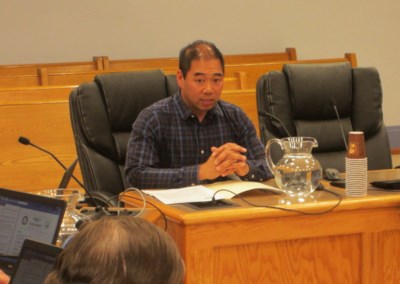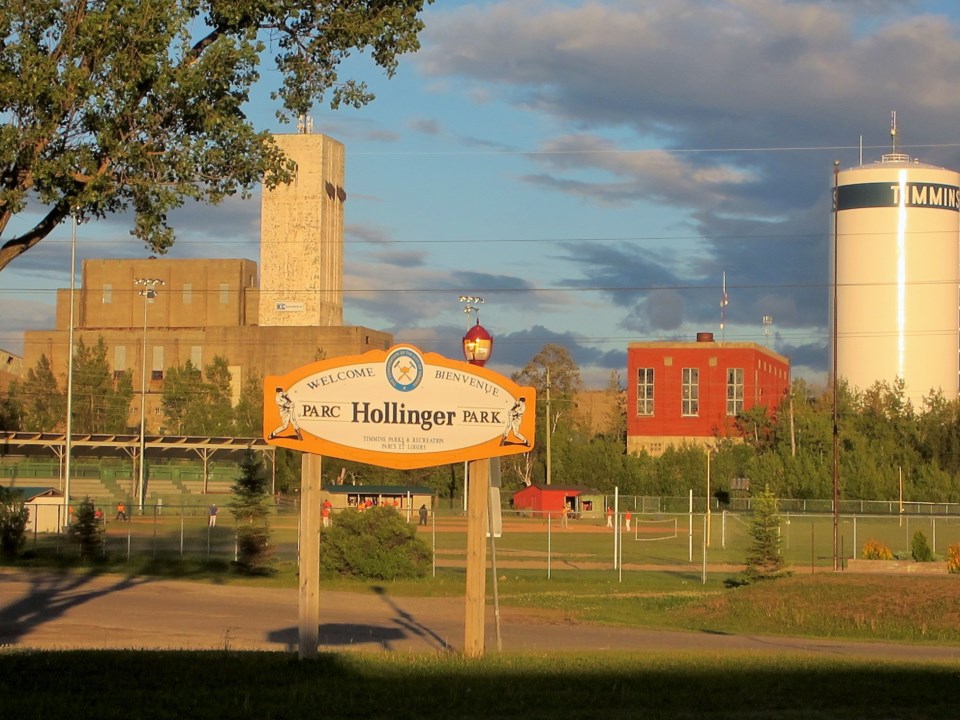AMEC Foster Wheeler has been given the sole-source green light to dig deeper in the dirt at the city's most popular park, amidst reports of high levels of metals within the soil.
The assessment will cost the city $40,000+HST.
It is the same company that performed soil testing and analysis at Hollinger Park in 2015. The Ministry of Environment did its own sampling in 2012.
The Hollinger Park soil saga is ongoing, and it is a confusing handful for not only the public, but for mayor and council as well.
City of Timmins Environmental Compliance Coordinator Scott Tam gave a brief update at city hall on Monday evening.
"Now that we understand what is happening at Hollinger Park with high levels of metal that has been found, as of last fall, the next step that we plan on doing is conducting a human health risk assessment. We want to basically, flush out any types of risks that are out there, for our city employees, for high users of the park. That's the next step. We're planning on starting that as soon as we get the green light to do. Hopefully, by the end of the summer we'll have our action plan in place, and we can start mitigation as soon as the late summer or fall. That's the aggressive approach to this whole situation right now," said Tam.
The floor was then opened for input, which was led by Councillor Joe Campbell, who said he'd been looking into arsenic, one of the chemicals that is allegedly higher than provincial standards in the park.
"I'm led to believe that arsenic can occur in drilled wells, totally away from civilization, so it occurs naturally in the ground at times. So how do we know this is not that situation?" asked Campbell.
"Arsenic can come in many forms. Whenever we eat seafood on a regular basis, there is arsenic content that we ingest. There's organic arsenic and inorganic arsenic. It's a very timely process to to undertake to verify is it organic or inorganic arsenic. It's more of a complex issue to verify, but there is methods in place," replied Tam.
Councillor Rick Dubeau inquired if it was possible that the issue could be stemming from a nearby current operation, such as Goldcorp's Hollinger Pit Project or the Imerys Talc facility.
Tam said he believed that when the Hollinger Park area was initially landscaped into a public park, there was a soil substance placed on top of mine tailings that may have simply compressed after many decades of pitter-patter.
"So as that top layer gets compacted, it just kind of dissolves and meshes in with the ground. So with this new plan going forward, we'll identify some mitigation measures. It might be a layering of certain materials, maybe we put a layer of clay liner over top that doesn't compact as easily. The likelihood of any surface exposure would be very limited from that point on," he said.
Councillor Noella Rinaldo said she was more confused than ever about the situation, and shared concerns about using the same consultants again.
"I wouldn't have minded a third opinion. This was also done by the M.O.E.(Ministry of Environment), I would have preferred someone other than AMEC Foster Wheeler. Are we doing it specifically because of the time, that its a little faster because they've already got the information?" she said.
"Basically that's the approach we took," said Tam, noting the time delay in putting the project up for an RFP (Request for Proposal) tender.
 Environmental Compliance Coordinator Scott Tam speaks at council. Andrew Autio for TimminsToday
Environmental Compliance Coordinator Scott Tam speaks at council. Andrew Autio for TimminsToday Mayor Steve Black echoed Tam's sentiments.
"In my opinion, due to the concern and the level of concern in the community, it is beneficial to get the work done as soon as possible" he said.
Black vented a little about the entire process and its lack of transparency.
"I can say it has been a very confusing and frustrating process to be a part of. Hearing that the M.O.E. first looked at it back in 2000 and it hasn't come to council up until now. Or that the reports were essentially internal, and stayed within M.O.E. until 2012, when they reviewed reports across the province" said Black.
He did however note that for most residents of the city, the presence of metals in local soils isn't entirely shocking. Rinaldo agreed.
"There's a minority that's really concerned, and the majority that understands its very likely not going to harm us, if we don't sit there and eat the soil," added Rinaldo.
She said that these latest documents did essentially nothing to clarify the situation.
"One minute its severe, they want us to work on it, and another they're going 'It's fine, hold your events there." If its not a big deal, can we live with it? Is it harmful in any way? It doesn't give me the impression that it is, or we'd be shutting it down right now," said Rinaldo.
Black agreed, and stated bluntly that if at any point, a recommendation came that the park was a health risk, it would be closed.
"That message has not come from a single person involved in this process," he said.
AMEC Foster Wheeler is a British multinational corporation. Their nearest office is in Sudbury.
Council voted in favour of moving ahead with the human health assessment. They await the results, and likely a presentation at a meeting later in the summer.
The bulk of the city's Canada Day celebrations take place in Hollinger Park on July 1.



